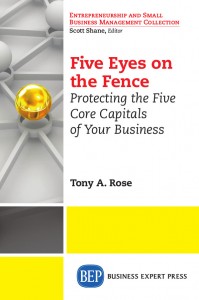
In my book Five Eyes on the Fence, I propose a way to look at what businesses, families and people really possess in terms of “capital.” The success or failure of a business lays in understanding the potential and actual consequences of more than financial capital. In fact, there are four other capitals that might be even more consequential than money. The interrelationship of these four capitals—sometimes coupled with financial capital—is what actually produces expansion or contraction of financial capital.
The financial consequences of a business owner’s decisions are driven by:
- Human capital—Who are the owners? What are their intelligences, instincts, and values? This is important because every decision is knowingly or unknowingly a manifestation of the value set of the business, family, or individual.
- Social capital—Who do the owners know and work with? When they are intentionally nurtured, these relationships can be leveraged for opportunity.
- Intellectual capital—What do the owners and other members of the company know? Are their gaps in knowledge that could be closed to strengthen the product or service?
- Structural capital—What processes do these people use to accomplish things?
In short, all the decisions surrounding these four capitals will either subtract from or enhance financial capital.